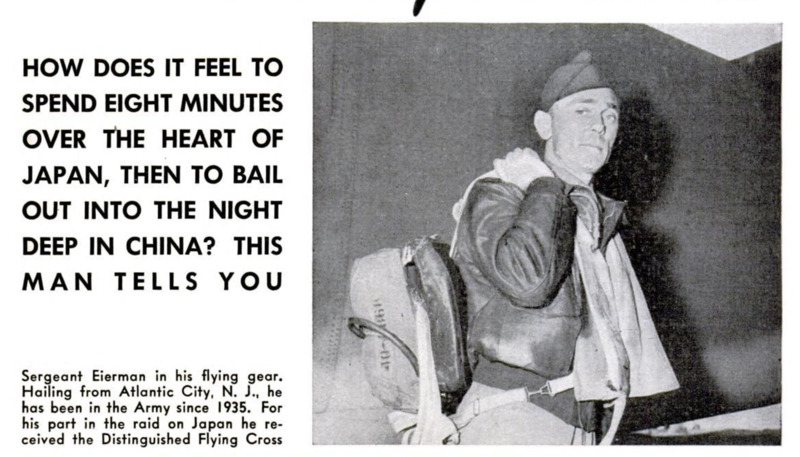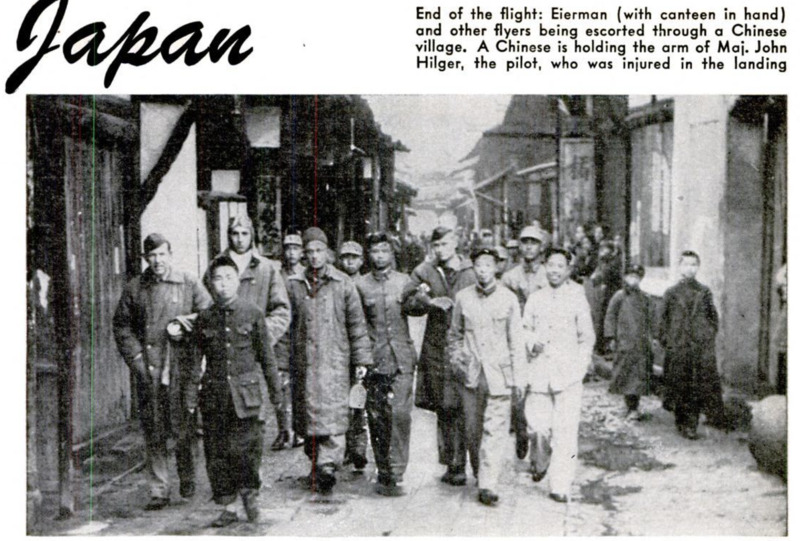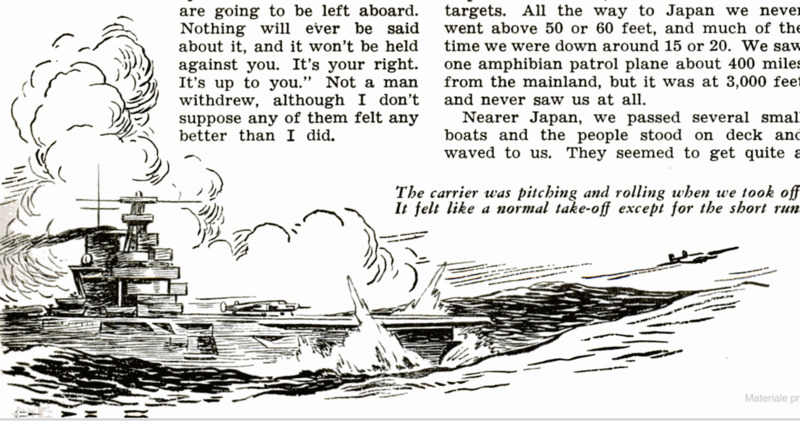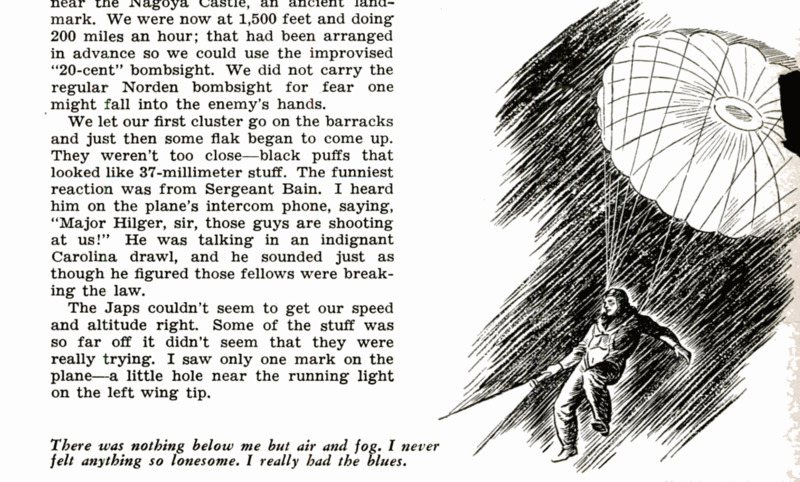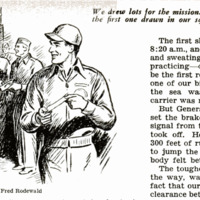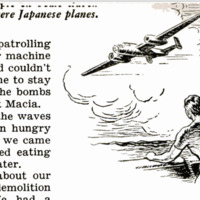-
Titolo
-
U. S. bomber flyer's deposition
-
Article Title and/or Image Caption
-
I Helped Bomb Japan. How does it feel to spend eight minutes over the heart of Japan, then to bail out into the night deep in China? This man tells you
-
extracted text
-
I FLEW on the Japan
raid, and it was the
biggest show I've ever
had a part in. I'd call
it a thoroughly successful operation. I know
that one bad break forced a change in the
plan, and later led to the loss of our planes
and a few of our men. But every plane went
where it was supposed to go, found its tar-
gets, and planted its bombs right where
they were supposed to fall.
I have been in the Army since 1935, when
I enlisted in the infantry. I transferred to
the Air Corps in 1936 and trained at Wheeler
Field as an engineer-gunner. Early in 1939
I was sent back to California and assigned
to my outfit, the 89th Reconnaissance
Squadron. All the men on the Japan raid,
by the way, came either from the 89th or
the 17th Bombardment Group.
Early in 1941 we got our B-25 bombers,
North American Mitchells. In February,
1042, word went around that volunteers
were wanted for “P.” That was our code
‘word for a special mis-
sion somewhere out-
side the country.
There were more
volunteers than they could use, so we drew
lots, both officers and men. My name was
the first drawn in our squadron.
‘We did our main training at Eglin Field,
Florida. There we worked and worked on
short take-offs with markings on the run-
ways. We also had gunnery and bombing
practice, and did long navigation missions
of eight and 10 hours, practicing celestial
navigation out over the Gulf.
Of course, the boys had some theories
about the nature of our mission. One was
that we were going to blast a big submarine
base in the Caribbean. But that was settled
when we went to the West Coast and got
charts that showed pretty clearly that we
were somehow going to China by way of
Japan.
We removed our lower turrets to install
extra gas tanks, and also had tanks in the
bomb bay and the crawlway leading to the
rear of the plane. After a final checkup we
went to the West Coast, then flew to a
rendezvous where our planes were loaded on
the flight deck of the aircraft carrier Hornet.
At 8:30 the next morning we sailed out
to sea, where we met up with cruisers and
destroyers which went along with us.
The weather almost all the way across
was dreary, misty, and rainy. Occasionally
we'd see the sun, but most of the days were
pretty bad; that was excellent for us. For
the first part of the trip it was a pleasant
life, We ate and lived with the chief petty
officers, and the food was swell. On a typical
day we could get up when we felt like it and
get breakfast until eight o'clock. Then we'd
go on deck and check up on our planes, ad-
just them, and go over equipment. To keep
in practice, we flew kites and fired at them
with the top-turret guns of our planes.
Every day General Doolittle held a meet-
ing with a lecture of some kind, on gunnery,
navigation, first aid, or bombardment. One
day a naval officer who had been an attaché
in Tokio talked about the terrain of Japan
and told us ways to tell a Chinese from a
Japanese, There wasn't time to learn any
language, but we memorized a Chinese
phrase, “Meg Wa Bing,” meaning “Ameri-
can Soldier.”
Our planes made the whole trip lashed to
the top deck. We had them dispersed around
so they covered the entire deck. It was
understood that if we were attacked we
would take off immediately and try to land
wherever we could—first at Hawaii and
later at Midway. If there wasn't time for
that we were to push our planes overboard
so that the carrier could get her own fight-
ers in action.
After we got west into the danger zone,
we had general quarters every day before
dawn and before sunset. After sunset gen-
eral quarters we'd have supper and in the
evening there wasn't much to do except talk
or play the old Navy game of acey-deucey.
We had been turning the engines of our
planes over every other day to keep them
tuned up, and now we refueled the planes
completely on the afternoon of April 17. We
understood that the plan was for us to take
off in the late afternoon either on the 18th
or 19th, when we would be about 400 miles
from Japan. We were to hit there around
dusk or a little after, and General Doolittle
was to go over about an hour ahead with
incendiaries to light up one main target so
that the rest of us could get our bearings
on that.
But it just didn’t work out that way. On
the morning of the 18th we suddenly sighted
a small vessel. It could have been a fishing
boat or a patrol boat, but we never knew.
One of our cruisers fired two salvos at it.
The first was just over, and after the second
there wasn't any more target to shoot at.
But there was no way to tell whether the
boat had got off a radio message, so the
decision was made to begin our raid im-
mediately, and the order, “Stand by to
launch your ships” came over the carrier's
loudspeaker system.
We had no chance to eat breakfast, and
most of us took off with empty stomachs.
The Navy did rustle some sandwiches for us,
though, and we took them along. Each man
also was issued a pint bottle of whisky for
emergency use.
We reported on deck and went directly
to our 16 planes, which were now grouped as
closely as possible at the back of the deck.
There were 80 of us in the plane crews—
five to each ship.
We knew we were going on a tough job.
At the plane our pilot, Maj. John A. Hilger,
told us we probably just didn’t have enough
gas.
“The way things are now, we have about
enough to get us within 200 miles of the
China Coast, and that's all,” he explained.
“If anyone wants to withdraw, he can do it
now. We can replace him from the men who
are going to be left aboard.
Nothing will ever be said
about it, and it won't be held
against you. It's your right.
It's up to you." Not a man
withdrew, although I don’t
suppose any of them felt any
better than I did.
The first ship was ready to take off about
8:20 a.m., and we all stood around, watching
and sweating it out. We had done plenty of
practicing—on land—but this was going to
be the first real take-off from a carrier with
one of our big bombers. To make it worse,
the sea was kicking up nasty and the
carrier was rolling and pitching.
But General Doolittle went first. He just
set the brakes, gunned his engines, got his
signal from the carrier's control officer, and
took off. He used only about 200 of the
300 feet of runway he had, and just seemed
to jump the plane off into the air. Every-
body felt better after seeing that.
The toughest thing about the take-off, by
the way, wasn't the run itself; it was the
fact that our bombers had less than six feet
clearance between the right wing tip and the
“island”—the big bridge structure of the
carrier. That was the worst hazard. After
four or five ships got off, one plane started
without lowering the wing flaps. It ran
right off the end of the deck and seemed to
drop, but the pilot managed to keep off the
water and gained altitude slowly. He was
all right.
Finally our turn came, and there were
two other ships left to go. It felt like a
normal take-off except for the very short
run. The rolling and pitching was so bad
that it took 15 men to hold the plane steady.
The biggest thing I remember about that
take-off was that I saw the carrier take
water over her bow just as we were heading
down to it. Major Hilger and the copilot,
Lieut. Jack A. Sims, were in their regular
places and I was crouching directly behind
and between them. Lieut. J. H. Macia, the
navigator-bombardier, was in his navigator's
place, and Sergeant Bain, our radio oper-
ator-gunner, was at the radio desk.
We got off, circled the ship once to check
our compass, course, and drift, then started
off. There was no flight formation. Each
ship was on its own, with orders for its own
targets. All the way to Japan we never
went above 50 or 60 fect, and much of the
time we were down around 15 or 20. We saw
one amphibian patrol plane about 400 miles
from the mainland, but it was at 3,000 feet
and never saw us at all.
Nearer Japan, we passed several small
boats and the people stood on deck and
waved to us. They seemed to get quite a
kick out of seeing “their” planes patrolling
s0 close to them. We tried out our machine
guns and the nose gun jammed and couldn't
be cleared. But the pilot ordered me to stay
in the nose and be ready to drop the bombs
if anything happened to Lieutenant Macia.
We approached land skimming the waves
at 20 feet. I guess we had all been hungry
and no one realized it. But just as we came
in over land. Sergeant Bain started eating
a sandwich—1I remembered that later.
By then we were all thinking about our
bombs. Our ships carried some demolition
and some incendiary bombs. We had a
special load of four 500-pound incendiary
clusters—that is, each cluster contained 128
four-pound incendiary bombs. Before the
take-off we had watched a little ceremony
on board, when the carrier's captain went
up and attached some Japanese medals to
the first bomb that was going to be dropped
from General Doolittle's plane.
We came in Over Japan just above the
treetops. Tt didn't look na’ cluttered and
crowded as wo had expected. It was like a
rural district anywhere, with green fields
nd open country. It Waa a brilliant. sun
shiny day by now, without a cloud in the sky.
Our target was Nagoya, u big industrial
center, ike Pittsburgh in the U.S. We hit
there about 1 pm. after circling from the
buy %0-as to come back and make our run
from the inland. We knew Tokio must have
caught it nearly an hour before, yet no ono
heered ready for us. Wo had no trouble
locating our targets, which were zigaagged
on either aide of a very prominent straight
Canal leading to the bay. There was no
AA ‘fire, and not another plane in the sky.
“The first target was u bg army barracks
near the Nagoya Castle, an ancient. land-
mark. We were now at 1.500 foct and doing.
200 miles an hour; that had been arranged
in advance 80 we could uso the improvised
“20-cent” bombaight. We did not carry the
regular Norden ‘hombeight for fear one
might fall into the enemy's hands
We let our first cluster go on the barracks
and Just then somo flak began to come up.
They weren't too close— black puffs that
looked like 37.millimeter stuff, Tho funniest
reaction was from Sergeant Bain. I heard
him on the plane's intercom phone, saying,
“Major Hilger, sir, those guys are shooting
at ual” He waa talking in an indigaant
Carolina drawl, and he sounded just ux
though he figured those fellows wera break-
ing the law.
“The Japs couldn't seem to got our speed
and aliitude right. Some of the stuff was
50 far off It. didn't seem that they were
really trying. I saw only one mark on the
plane—a little hole near the running light
On the left wing tip.
Our second target was a big arsenal or
some kind of army depot. Now, I hadn't
seen the first bomb land, but I sure saw this
one; it went right down on the target,
dispersed beautifully around it and hit
particularly hard around one corner.
The third target was an oil-storage ware-
house. I saw that one and it seemed like
a perfect hit. The AA fire slowed down
then; I suppose we had run out of the area
where the guns were. But it started up
harder than ever as we approached the
fourth and last target, the Mitsubishi air-
craft works. That was a beautiful hit, too. T
could see the bombs strike and flames burst
up all over it. Of course we couldn't stick
around long enough to check up on exactly
how much damage we had done. I saw a
funny thing there, too. As we passed over,
a cleaning woman rushed out of one door
and shook a mop at us!
Major Hilger suddenly called out: “Look,
they've got a ball game on over there. I
wonder what the score is.” It was a baseball
game, sure enough, and a big crowd was in
a wild scramble getting out of there fast.
With our bombs gone we went down to low
altitude again and came out over the bay.
We had one more target—oil tanks on the
waterfront to be blasted with .50 caliber
machine-gun incendiary bullets. Sergeant
Bain, in the top turret, cut lose at them, then
climbed down. I looked at him and burst
out laughing. His left fist was clenched
tight and his fingers were oozing peanut
butter and jelly from that sandwich he had
started to eat as we swept in over Japan.
The whole raid had taken us about eight
minutes, and he had never let go.
* Well, with the excitement over for a
minute, anyway, we felt a little let down.
We did see one plane back of us over the
city and it suddenly disappeared in a big
cloud of AA fire. We know mone of our
planes was shot down, so I've always sup-
posed some Jap ship came along and caught
it; they have a bomber, I think the Mitsu-
bishi 97, which is said to look something
like a B-25.
‘We turned south to run down the coast |
before heading for China. And now our
main worry was about our gas supply. But
when we turned west again over the China
Sea, we ran into fog patches and squalls, and
the storm we were getting into kicked up a
35-mile-an-hour tail wind to help us along.
That made us feel better, although no’.
exactly good. It was still a_hit-or-miss
proposition. If the tail wind held, we knew |
we could probably make the China coast.
But what then? We were flying low to save |
fuel, but running into increasingly bad
patches of fog. That forced us up to 500 feet,
and kept us flying blind most of the time.
By dark we were completely blind, with |
no way of estimating drift or sighting on a
star. We had to go up to 7,000 feet to clear
a mountain range we knew was just back of
the coast. And farther inland we knew we'd
hit even higher mountains. Finally, with less
than an hour's fuel left, the pilot told us we
were going to have to bail out. I remember
we had a long discussion on whether to take
our musette bags or not. I took mine, and
also salvaged my pint of whisky.
It's funny what you'll think of at a time |
like that. I was bitterly regretting having
to leave the 15 cartons of cigarettes 1 had
bought aboard the carrier at 60 cents a
carton. Bain felt even worse. He preferred
cigars, and when he went out he had to
leave the first box of 10-cent cigars he had
ever been able to buy in his life, and he
never got to smoke even one of them.
Sergeant Bain jumped out first, and then I |
went through the bottom escape hatch. That
hatch looked awfully deep and black as I |
went out and I hesitated a minute, wonder-
ing whether to go head first or feet first. I |
finally went feet first and got a good bump
in the head. The next thing I knew I was
in the air and my chute was open. I shined
my flashlight and there was nothing below
me but air and fog. I never felt anything
50 lonesome; I really had the blues,
Just above the earth my light showed
water, and I thought it was the ocean. But
it was a rice paddy with a stream running
through it. 1 lit running, on both knees, and
got out of that parachute in nothing flat.
T pulled myself together and walked about
two miles to a tiny settlement, but found
that all the doors were barred and no one
would answer my knocking. It was raining
and I was wet and cold and miserable.
After what seemed like hours I found a
man and his wife and persuaded them (by
sign language) that they had nothing to
fear. They took me to their home, next to
a big Chinese temple, and called out the
whole family. A very old man took charge
then, but we still couldn't understand a
word of each other's language. They gave
me a place to sleep and offered me food, but
1 played safe and stuck to my own canteen
and emergency rations.
The next day a young boy not over 14—
guided me about 10 miles to a larger town
where a Chinese officer took me to a military
headquarters. I saw a flat map of the world
hanging on the wall, and pointed to the U.S.
and then to myself. They beamed and under-
stood that, all right. Later Lieutenant Macia
showed up, and the Chinese made signs to
show us there were three more. Our entire
crew was reassembled. Bain was the last to
come in. He had been knocked out landing
with his parachute and spent the night on a
mountain top.
We were all taken then to a big military
post where we had our first real meal in
China, with fried eggs, sweet sauce, bamboo
and bean sprouts, salt bread, and tea. We
thought it was a banquet, but it was nothing
compared to the luncheon General Ku later
gave us at Third War Area Headquarters:
They had 50 dishes, including a special treat
for us—the American dish, chop suey!
Later we were sent by train and bus to
a big air base built for the U. S. Army.
From there, one of our C-47 transport ships
flew us to Chungking. There we were told
that we had been awarded the Distinguished
Flying Cross. And at another luncheon
Mme. Chiang Kai-shek presented us with
the Chinese Army and Navy Air Force
Medal.
From China I was transferred to India
and from there later ordered back to the
United States. And the first thing I did
when I landed back in the good old U. S. A.
was to go out and mow down a couple Of
American T-bone steaks.
-
Autore secondario
-
Jacob Eierman (writer)
-
Fred Rodewald (illustrator)
-
Lingua
-
eng
-
Data di rilascio
-
1943-07
-
pagine
-
64-68
-
Diritti
-
Public Domain (Google digitized)
-
Archived by
-
Matteo Ridolfi
-
Alberto Bordignon (Supervisor)
-
Copertura territoriale
-
Japan
